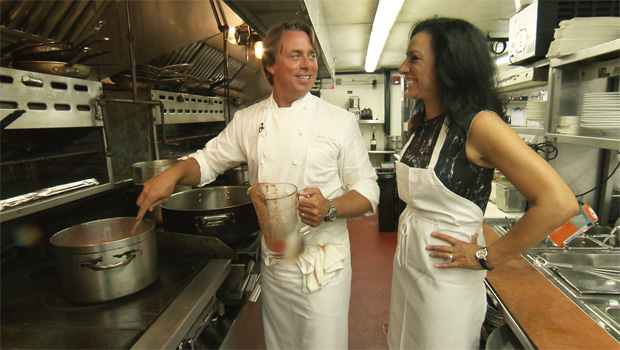The heart and soul of chef John Besh's cooking
Great food is a tradition chef John Besh is determined to maintain. Ten years ago he opened his heart and soul to the storm's hungry victims. More recently, he opened his kitchen to our Michelle Miller:
"New Orleans has its own flavor," chef John Besh says. "And I think part of that flavor is the soul that really goes into it."
Besh knows something about the soul of New Orleans. "The food of New Orleans is the only indigenous urban cuisine left," he said. "You come to our city, you open up any menu, you know exactly where you're at."
The Besh Restaurant Group has 10 restaurants in New Orleans, and employs over a thousand people. Besh himself is a fixture on television and has written four cookbooks, including his latest: "Besh Big Easy."
He says in addition to serving up food, his restaurants evoke emotion: "Everything that we do here should take us back to our childhood." For example, with every cookie plate comes cookie batter, just like when you licked the batter off the mixer.
Miller met up with Besh at his newest venture, the just-opened bakery and café Willa Jean. Besh told her he'd always wanted to be "a New Orleans chef."
The 47-year-old Besh could almost see New Orleans from Slidell, La., where he grew up as one of six kids of a stay-at-home mom and airline pilot father.
Besh started cooking after his father was paralyzed: "I was nine years old. And he was hit by a drunk driver, paralyzed for life. At that point, I started cooking breakfast for my siblings. And I wasn't the smart one -- I mean, we got smart ones, I was just, like, the dumb one that liked making breakfast and serving the kids. And so that kind of became my job. I loved to cook."
And he kept cooking, developing his own unique take on time-honored recipes.
"I would always do, like, riffs on my mom's shrimp Creole. I would add a little something [and] make it my own. And then, when I had a chance to finally stand out on my own, I wanted to honor some of those great dishes that I've had in the past. And so, I'm just trying to bring a little refinement to them, and that's pretty much all I do still today."
Before his culinary career took off, Besh joined the Marines, where he served in Iraq during Operation Desert Storm. "That was a time that I got to mature a lot. And at a young age, learning how to deal with people that don't look like you, don't talk like you, that really helped me a lot in growing as a chef."
He returned home to start a family and work his way up the New Orleans food scene, eventually becoming the executive chef and owner of August Restaurant.
Life was good, but something was missing.
"I did fall into the trap of being that selfish chef just focused on building this great place. And it was Katrina that really brought me back to my roots of, 'No. We have to live now and really serve other people.' And that's what it really comes down to."
When the storm hit, he shut his restaurant down and left with his family, only to return to a devastated city.
"And then I get here and I see the fires and I see the smoke and I see the water, and you see people in such despair. And I just remember at this one point thinking, 'God has put me here for a reason. I have resources. I have a talent. What am I going to do to help?'"
What he could do was cook.
"And we just started cooking," Besh said. "We'd cook red beans and rice around the clock. And either myself or some of my Marine friends would ride around just scooping and serving these red beans to people."
And when he wasn't cooking, he was reaching out. The Treme neighborhood was in bad shape ("We're talking about six to eight, I think 12 feet of water just down the street"), including the fabled fried chicken place, Willie Mae's Scotch House, which was in danger of closing forever.
So Chef Besh set out to help save it.
"Whoever was going to come and help out rebuilding Willie Mae Scotch House, we were gonna feed 'em for free," he said.
"They were determined," said Kerry Stewart, who runs the family-owned Willie Mae's, which was founded by her great-grandmother. "And failure was not an option."
"You say that with tears in your eyes. Because?" Miller asked.
"I mean, I cried many a days in the storeroom. You know, if I just had a moment, I'd just go back there and I'd be, like, 'Whoooo,' you know?"
Besh said, "After the storm, these places became cornerstones that people in an act of defiance would come and eat out in, in order to show their resilience for defeating all this adversity."
In the 10 years since Katrina, Besh has not only grown his own empire but he's continued his work in the community.
"If we're going to sustain the culture, then we have to make sure that we invest in its people," he said. "And so here I am, I've become pretty famous just from cooking New Orleans food, right? But we all have to share in that. And we all have to have opportunities to participate in that."
So he started the John Besh Foundation, which gives loans and scholarships to local people -- the only requirement being that they give back to New Orleans in turn.
It's something John Besh takes to heart.
"I think if nothing else, what's really come out of this whole tragedy of the storm is, we started with a blank slate. And we haven't gotten everything right. And it won't be done tomorrow, but I think that if I can use food to shape a better tomorrow for New Orleans, then that's what I'm supposed to do."
For more info:
- chefjohnbesh.com
- Willa Jean, New Orleans
- "Besh Big Easy: 101 Home Cooked New Orleans Recipes" by John Besh (Andrews McMeel)
- Follow @ChefJohnBesh on Twitter, Facebook and Instagram
- Follow the John Besh Foundation on Facebook
- Chefs Move! The John Besh & Bride Mayor Scholarship

